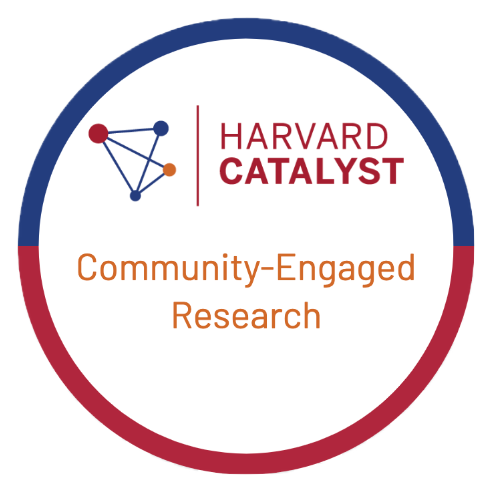Course badge
All course participants may receive a downloadable digital badge (shown below) that can be added to email signatures, LinkedIn profiles, and more.

For more information:
Email UsCourse Goals
- Prepare community partners and researchers for effective collaboration
- Explore the range of community-oriented research aims, concepts, tools, and practices
- Share with and learn from co-participants in the course, with discussions delving into common preconceptions, experienced challenges, and ideas for fostering trust and mutual support
Community engagement in research provides an opportunity for greater trust and respect to be built between academic researchers and communities and, ultimately, improved community health. Therefore, this course was designed for both researchers and community members in mind. The purpose of this online course is two-fold: to build the skills of researchers to develop trusting relationships and impactful research with the community and to prepare community partners to engage in health research.
Participants will learn key considerations when setting out to begin community-engaged research and will have the opportunity to engage in deep discussion with one another on topics in the field. Additionally, participants will hear perspectives from a myriad of seasoned researchers and community members on how to make health research more inclusive.
This course consists of three core modules that can be taken in succession or individually. These core modules will focus on:
- methods and principles of community-engaged research;
- cultivating effective collaboration between community members and researchers;
- and how to incorporate community-engaged concepts into research studies and practice settings.
Session dates
August 28 – October 23, 2024
Time commitment
Three self-paced online modules which include video, participant discussions, and course activities over two months
Audience
Open to all with interest in learning more about the basic principles of incorporating community engagement in health research.
We believe that the research community is strengthened by understanding how a number of factors including gender identity, sexual orientation, race and ethnicity, socioeconomic status, culture, religion, national origin, language, disability, and age shape the environment in which we live and work, affect each of our personal identities, and impacts all areas of human health.
Eligibility
- Public health and clinical researchers in the U.S.
- Community practitioners and community members across the U.S., such as:
- Local health department staff
- Community organization staff
- Community members interested in health research
Fee
- Free for Harvard-affiliated institutions
- CTSA member: $1125 (Note: this is a 25% discount off the standard fee.)
- Non-CTSA member: $1500
- If you are a community practitioner or resident, please indicate this on your registration and we will determine the fee.
- Cancellation and Refund Policy [PDF]
-
To inquire about available discounts, contact us.
- Additional 10% off for nurses and Allied Health Professionals (can be combined with other discounts)
- Community Partners of Harvard Catalyst Programs
- Countries with GNI below $13,000
Register
The registration period will begin on Wednesday, July 10, 2024 at 8am EST.

